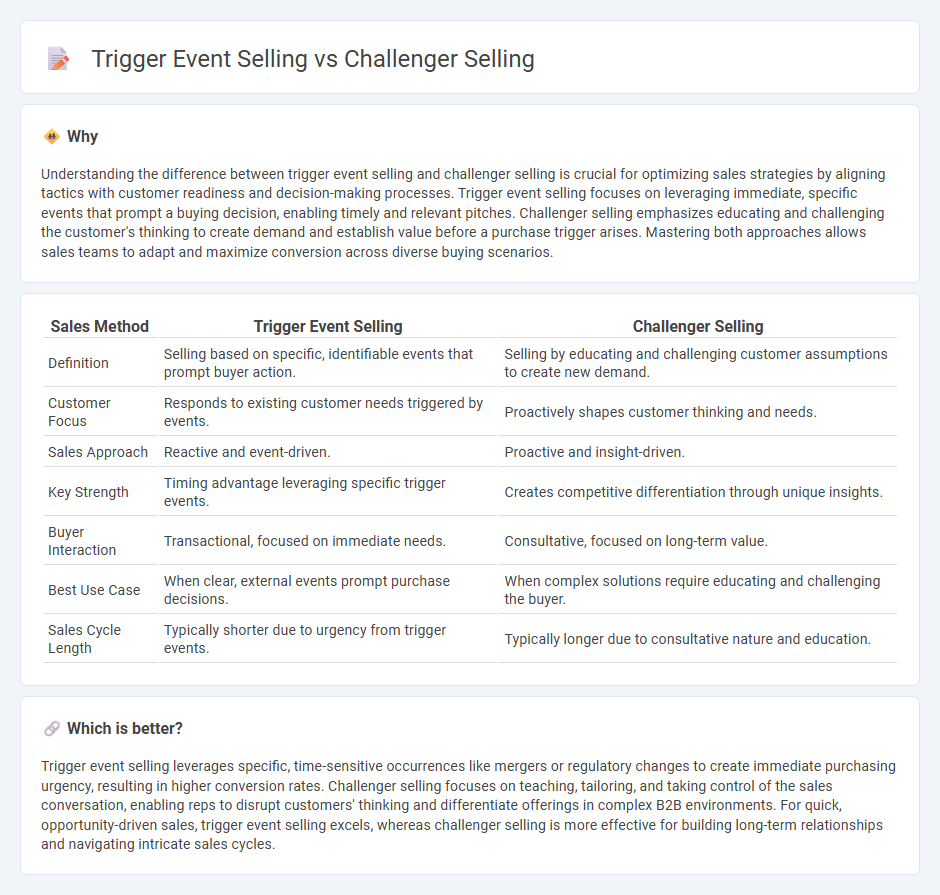
Trigger Event Selling leverages specific, time-sensitive incidents to initiate sales conversations, focusing on immediate client needs and opportunities. Challenger Selling concentrates on teaching, tailoring, and taking control of the customer dialogue to push buyers out of their comfort zones and drive transformational change. Discover how these distinct strategies can optimize your sales approach and improve conversion rates.
Why it is important
Understanding the difference between trigger event selling and challenger selling is crucial for optimizing sales strategies by aligning tactics with customer readiness and decision-making processes. Trigger event selling focuses on leveraging immediate, specific events that prompt a buying decision, enabling timely and relevant pitches. Challenger selling emphasizes educating and challenging the customer's thinking to create demand and establish value before a purchase trigger arises. Mastering both approaches allows sales teams to adapt and maximize conversion across diverse buying scenarios.
Comparison Table
| Sales Method | Trigger Event Selling | Challenger Selling |
|---|---|---|
| Definition | Selling based on specific, identifiable events that prompt buyer action. | Selling by educating and challenging customer assumptions to create new demand. |
| Customer Focus | Responds to existing customer needs triggered by events. | Proactively shapes customer thinking and needs. |
| Sales Approach | Reactive and event-driven. | Proactive and insight-driven. |
| Key Strength | Timing advantage leveraging specific trigger events. | Creates competitive differentiation through unique insights. |
| Buyer Interaction | Transactional, focused on immediate needs. | Consultative, focused on long-term value. |
| Best Use Case | When clear, external events prompt purchase decisions. | When complex solutions require educating and challenging the buyer. |
| Sales Cycle Length | Typically shorter due to urgency from trigger events. | Typically longer due to consultative nature and education. |
Which is better?
Trigger event selling leverages specific, time-sensitive occurrences like mergers or regulatory changes to create immediate purchasing urgency, resulting in higher conversion rates. Challenger selling focuses on teaching, tailoring, and taking control of the sales conversation, enabling reps to disrupt customers' thinking and differentiate offerings in complex B2B environments. For quick, opportunity-driven sales, trigger event selling excels, whereas challenger selling is more effective for building long-term relationships and navigating intricate sales cycles.
Connection
Trigger event selling leverages specific occurrences or changes in a prospect's environment to initiate timely sales conversations, while challenger selling focuses on teaching and tailoring insights based on customer needs. The connection lies in using trigger events to identify moments when buyers are more receptive to innovative solutions presented through challenger selling techniques. This integration enhances sales effectiveness by aligning opportunity timing with a disruptive, insight-driven sales approach.
Key Terms
**Challenger Selling:**
Challenger Selling centers on teaching sales professionals to challenge customers' thinking and provide unique insights that reshape their purchasing criteria, emphasizing tailored solutions over product features. This approach leverages assertive communication and deep customer understanding to disrupt the status quo, ultimately driving higher engagement and conversion rates. Explore how adopting Challenger Selling can transform your sales strategy and boost results.
Insight
Challenger Selling centers on delivering unique insights that challenge customers' existing thinking, encouraging them to see their needs in a new light and driving proactive solutions. Trigger Event Selling leverages specific events or changes within a company, such as mergers or expansions, to present timely and relevant opportunities tied to those shifts. Explore how combining these approaches can maximize your sales effectiveness and customer engagement.
Teaching
Challenger Selling emphasizes teaching customers by delivering unique insights that challenge their current thinking and offer tailored solutions to their pain points. Trigger Event Selling leverages specific events or changes within a customer's business environment to initiate timely and relevant conversations that address emerging needs. Explore the distinctions between these approaches to optimize your sales strategy effectively.
Source and External Links
What is the Challenger Sales Model? + 25 Discovery ... - The Challenger Sales methodology focuses on teaching, tailoring, and taking control of the sales process by identifying a hidden or unrecognized customer problem and showing how only the seller's solution can solve it, using powerful requests to engage serious prospects.
What is the Challenger Sales Methodology? - Challenger Selling uses five steps: warm-up with knowledge of challenges, reframe the problem, create emotional impact with stories, deliver value proposition, and present the solution, guiding prospects through a compelling sales narrative.
The Challenger Sale | Sales, Marketing, & CS Approach - Challenger selling disrupts customers' current thinking by teaching them insights rather than just selling, enhancing sales effectiveness and customer relationships with tailored training, marketing, AI tools, and customer service skill development.
 dowidth.com
dowidth.com